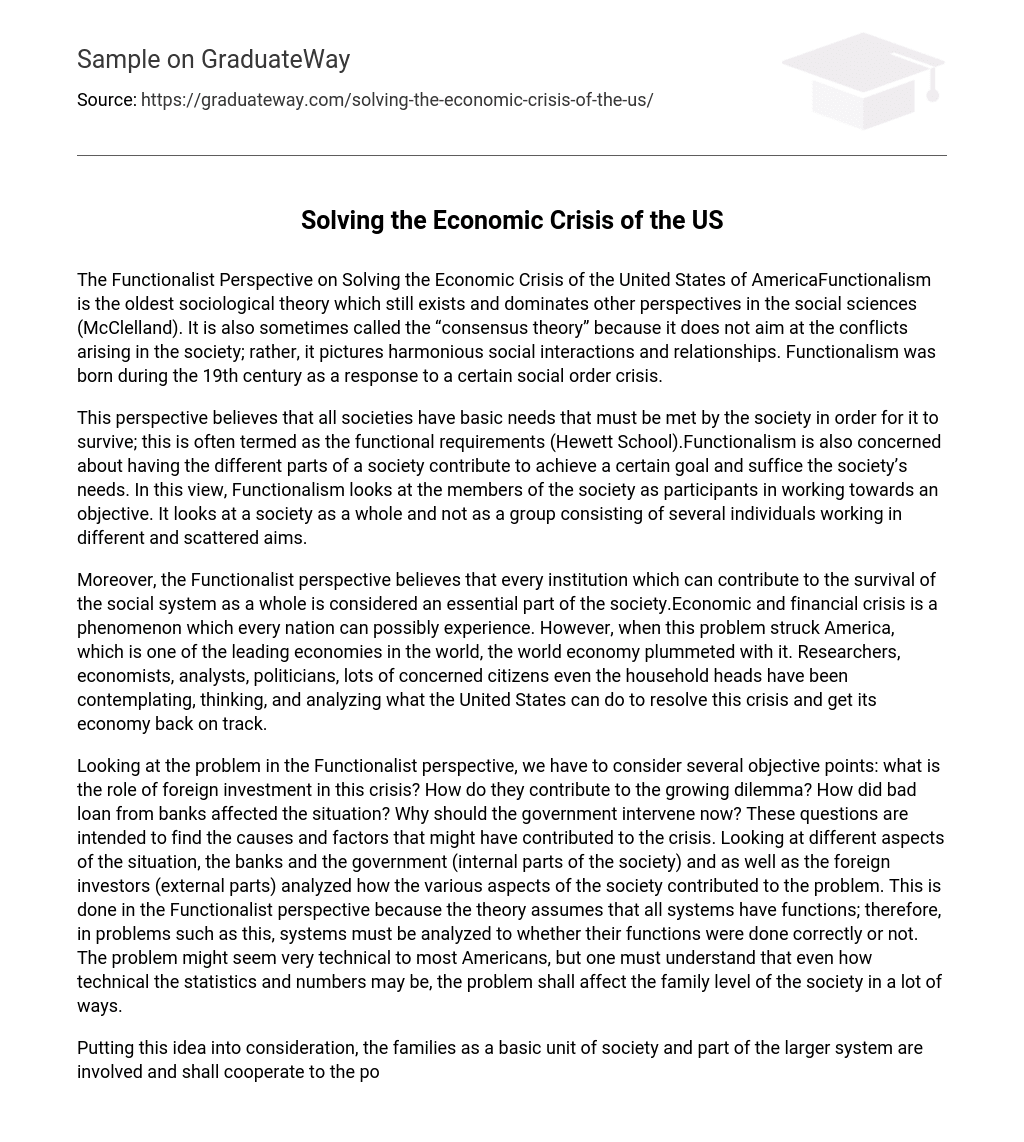The Functionalist Perspective on Solving the Economic Crisis of the United States of AmericaFunctionalism is the oldest sociological theory which still exists and dominates other perspectives in the social sciences (McClelland). It is also sometimes called the “consensus theory” because it does not aim at the conflicts arising in the society; rather, it pictures harmonious social interactions and relationships. Functionalism was born during the 19th century as a response to a certain social order crisis.
This perspective believes that all societies have basic needs that must be met by the society in order for it to survive; this is often termed as the functional requirements (Hewett School).Functionalism is also concerned about having the different parts of a society contribute to achieve a certain goal and suffice the society’s needs. In this view, Functionalism looks at the members of the society as participants in working towards an objective. It looks at a society as a whole and not as a group consisting of several individuals working in different and scattered aims.
Moreover, the Functionalist perspective believes that every institution which can contribute to the survival of the social system as a whole is considered an essential part of the society.Economic and financial crisis is a phenomenon which every nation can possibly experience. However, when this problem struck America, which is one of the leading economies in the world, the world economy plummeted with it. Researchers, economists, analysts, politicians, lots of concerned citizens even the household heads have been contemplating, thinking, and analyzing what the United States can do to resolve this crisis and get its economy back on track.
Looking at the problem in the Functionalist perspective, we have to consider several objective points: what is the role of foreign investment in this crisis? How do they contribute to the growing dilemma? How did bad loan from banks affected the situation? Why should the government intervene now? These questions are intended to find the causes and factors that might have contributed to the crisis. Looking at different aspects of the situation, the banks and the government (internal parts of the society) and as well as the foreign investors (external parts) analyzed how the various aspects of the society contributed to the problem. This is done in the Functionalist perspective because the theory assumes that all systems have functions; therefore, in problems such as this, systems must be analyzed to whether their functions were done correctly or not. The problem might seem very technical to most Americans, but one must understand that even how technical the statistics and numbers may be, the problem shall affect the family level of the society in a lot of ways.
Putting this idea into consideration, the families as a basic unit of society and part of the larger system are involved and shall cooperate to the policies that would be set by the government in order to resolve the situation. As the Functionalist theory suggests, a society is never a group of separated individuals; rather, it is always a sole working system. Even Dominique Strauss-Khan of the International Monetary Fund further told the Marketwatch that no country can stand on its feel alone. He further added (in a Functionalist perspective) that, “Cooperation and coordination is the price of success” (qtd.
in Nutting). This cooperation and coordination shall therefore come from the working and cooperating parts of the system.Works CitedMcClelland, Kent. ‘Functionalism.
” Grinnell College Academic Site. 24 February 2000. 29 October 2008 <http://web.grinnell.
edu/courses/soc/s00/soc111-01/IntroTheories/Functionalism.html>.Hewett School, Norwich. Sociology at Hewett: Functionalism as a Sociological Perspective.
28 May 2002. 29 October 2008 <http://www.hewett.norfolk.
sch.uk/curric/soc/T&M/funct.htm>.Nutting, Rex.
“Crisis is Serious But Can Be Solved, IMF Says.” MarketWatch Inc. 9 October 2008. 29 October 2008 <http://www.marketwatch.com/news/story/crisis-serious-can-solved-imf/story.aspx?guid={E1A1F66C-1527-4215-9F8B-E7EB4B3B3DF0}>.





